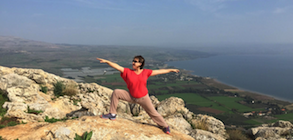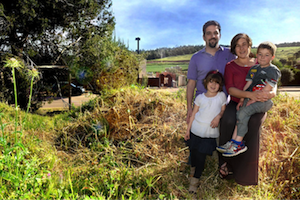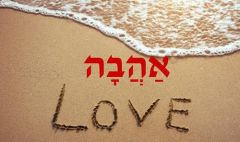Magical World by Sara Brandes
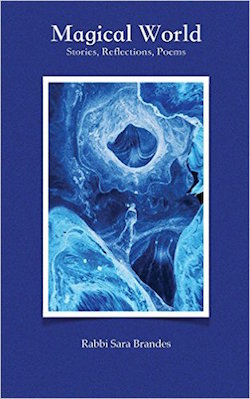
A spiritual memoir, Magical World: Stories, Reflections, Poems is the story of one woman’s blossoming relationship with the land of Israel, her wrestling with questions of meaning, purpose and paradise.
"The land of Israel caught me off guard. She took my breath away. It was the way she changed, day to day, I think, that inspired me to break my schooled rational silence, in order to proclaim, 'The World Is Magical!'"
Read More About Magical World
Discussion Questions:
- Before diving into Magical World, take a few minutes to share your personal impressions and experiences of Israel. Have you visited? What did you feel when you first arrived there? Many say that visiting Israel is like coming home, while others feel that it is a far off land, with a language and culture very different from there own. How is it for you?
- For the author, being in Israel is like living life in High Definition. Everything there is bolder, brighter and more real, for better and for worse. Her poem “The Real World”(p.4) captures this sensation. Share a memory of a time that you felt that you were touching “the world where everything is real,” whether in Israel or elsewhere.
- In Magical World, the author shares her personal story of falling in love with her husband (“Love” p.17), and their mutual sensation that they had lived together before in the Land of Israel. Share stories of deep connection you have had when visiting Israel (or other ancient and/or sacred sites).
- In her essay, “In the Land,” (p. 59) the author presents the view of Rabbi Abraham Isaac Kook, first Chief Rabbi of Israel, who claimed that Judaism can only come to full fruition in the land. She notes, “The return to the Land of Israel was a return to the body, to embodied Jewish practice, which allowed for the expression of religious life through the hands that touch, the mouth that tastes, the feet that walk the sacred earth.” How do you connect to a Judaism of the senses in your daily life? How might your Judaism be experienced or expressed differently in the land of Israel?
- In her essay, “Bread and Cheese,” (p. 61) the author tells the story of her visit to the Kfar Kedem Educational Center in Hoshaya, Israel, where she learns how to make fresh cheese. She reflects, “For me, the impact of reclaiming the most basic human knowledge, the knowledge that fed and sustained every generation from Cro-Magnon to pre-modern, is a cosmic shift. It actualizes the very purpose of religious living, to locate me in time and space, in a concrete and meaningful way. “ Does your Judaism connect you with nature? In your opinion, is such a connection different in the Land of Israel, also known as Eretz Ha’Kodesh, or the Holy Land (i.e.. earth)?
- In her essay “Arrival,” (p. 56) the author wrestles with the challenges of living in Israel, including questions of safety. Referencing Numbers 13:32, she says “The Torah makes no secret about life in the Land of Israel. Blessed, sacred, flowing with milk and honey, she is also a land that ‘devours her inhabitants.’ In your opinion, how should the Jewish people cope with the challenges of nation building in the Middle East? *As a group, you might choose to take this opportunity to read the story of the scouts who first explore the land of Israel, as recounted in the Book of Numbers, chapter 13*
- Kibbutzim are a part of the special legacy of the modern State of Israel. In her essay, “A Shared Existence,” (p. 67) the author reflects, “For me, our American dreams of personal picket fences separating nuclear family units—felt much more like a prison than a palace.” How does this reflection resonate for you? What useful lessons can be taken from kibbutzim to enrich life in non-communal settings? **Your group might choose to screen the documentary Happy, directed by Roko Belic (available on Netflix), which inspired the author, to deepen this discussion.**
- In Magical World, the author wrestles with questions of terror, tragedy and evil. In the essay, “The Union of Opposites,” (p.65) she remarks “Despite all of the pain, the loss, the bloodshed, we seem to be unable to avoid the instinct to arrange ourselves into this group or that, only to face one another in conflict.” Leaving aside global conflicts, how do you feel the push and pull of opposites at play in your life? How are you striving to be a “Warrior of Light,” as suggested in the reflection “Evil” (p. 39)?
- The author wrestles with the Arab-Israeli conflict in her poem “My Brother, The Ass,” (p. 64) based on the Biblical story of Isaac and Ishmael. What new perspective does considering the conflict through this ancient lens offer us?
- In the poem “Paradise,” (p. 70) the author wrestles with the idea that we all have a place where we belong. For her, that place is Israel. She writes, “There is a place in the world from which our own dust was gathered/that is of us, as we are of it/There is a place in the world where our hearts are meant to open/where we can find freedom in the here and now.” Do you have such a place? In your opinion, is Israel that place for the Jewish people?
The Reading Israel Book Club's Book of the Month
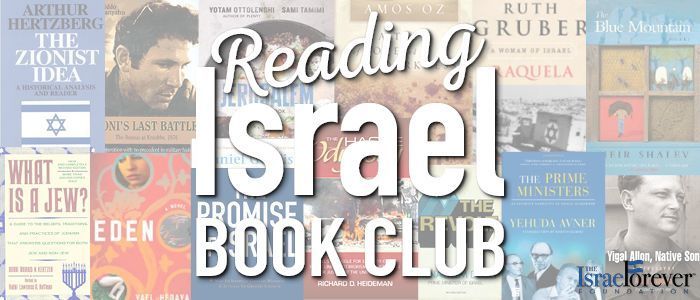
Every month, the Reading Israel Book Club at Israel Forever brings you a new literary delight to grow your Israel connection through the written word.
We hope that you enjoy our selections and participate in discussion not only with your friends and family but with an international community of readers in our open discussion group on Facebook.

